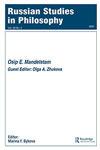苏联的计划与现实:哲学历史札记
IF 0.1
4区 哲学
Q4 Arts and Humanities
引用次数: 0
摘要
苏联作为一种现象的哲学分析在其形成一百周年即将到来之际具有现实意义。这一事件的意义源于苏联庞大的规模和历史上独特的组成,其中包括数十个国家和民族。这一形成取代了同样庞大的俄罗斯帝国,但并不是由于自然发展,而是通过适应国内条件的欧洲马克思主义在其废墟上崛起的。世界上没有任何地方像苏联这样的社会和国家是自发产生的,而第二次世界大战后建立的东欧“人民民主”国家一再试图摆脱苏联的亲属关系和统治,并将随着苏联的崩溃而立即消失。在这篇文章中,苏联在其项目和现实中是什么的问题是在以下背景下讨论的:马克思主义对俄罗斯土地问题的解决方案及其随后的国际化,以创建“世界工农联盟”(V.I.列宁);分析了以强迫劳动为主要手段创造“社会主义劳动者”的原则;苏联形成了一个“准联邦”的人民共同体,“形式上是民族的,内容上是社会主义的”;以及强迫东欧人民加入新兴的“世界苏联”,作为他们从法西斯主义中解放出来的“报酬”。这篇文章证明了这样一种说法,即如果不分析这些思想和现象的基本作用,人们很难期望对苏联的性质有一个全面的了解。本文章由计算机程序翻译,如有差异,请以英文原文为准。
The Soviet Union in Its Project and Reality: Philosophical-Historical Notes
ABSTRACT Philosophical analysis of the Soviet Union as a phenomenon is relevant in light of the approaching centennial of its formation. The significance of this event derives from the Soviet Union’s enormous scale and historically, qualitatively unique formation that included many dozens of nations and nationalities. This formation replaced the equally enormous Russian Empire but arose not due to natural development but on its ruins, by the means of a European Marxism adapted to domestic conditions. Nowhere in the world have societies and states like the Soviet Union arisen spontaneously, while the Eastern European “people’s democracy” countries created after the Second World War repeatedly attempted to free themselves from the kinship and dominance of the Soviet Union and would disappear immediate with its collapse. In this article, the question of what the Soviet Union was in its project and reality is discussed in the following contexts: Marxist solutions to Russia’s agrarian question and their subsequent internationalization to create a “world union of workers and peasants” (V.I. Lenin); analysis of the principle of forced labor as the primary means of creating the “socialist working man”; the formation of the Soviet Union as a “quasi-federal” community of peoples “national in form, socialist in content”; and the forced inclusion of Eastern European peoples in the emerging “world Soviet Union” as “payment” for their liberation from fascism. This article justifies the claim that without analysis of the essential role of these ideas and phenomena, one could hardly expect to gain a holistic understanding of the nature of the Soviet Union.
求助全文
通过发布文献求助,成功后即可免费获取论文全文。
去求助
来源期刊

RUSSIAN STUDIES IN PHILOSOPHY
PHILOSOPHY-
CiteScore
0.10
自引率
0.00%
发文量
14
期刊介绍:
Russian Studies in Philosophy publishes thematic issues featuring selected scholarly papers from conferences and joint research projects as well as from the leading Russian-language journals in philosophy. Thematic coverage ranges over significant theoretical topics as well as topics in the history of philosophy, both European and Russian, including issues focused on institutions, schools, and figures such as Bakhtin, Fedorov, Leontev, Losev, Rozanov, Solovev, and Zinovev.
 求助内容:
求助内容: 应助结果提醒方式:
应助结果提醒方式:


